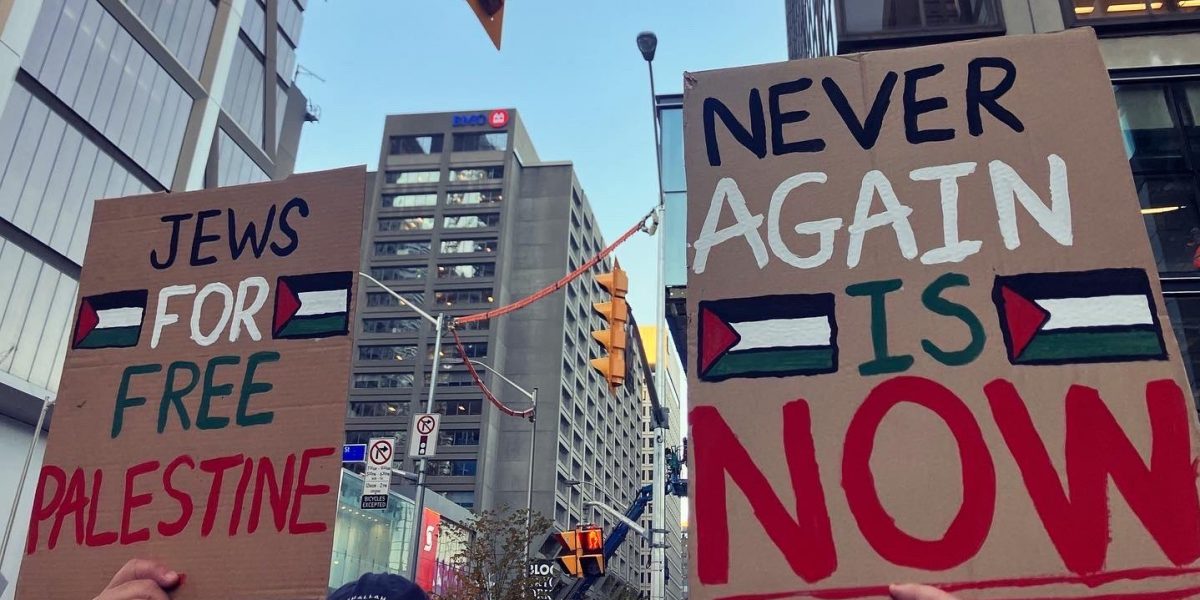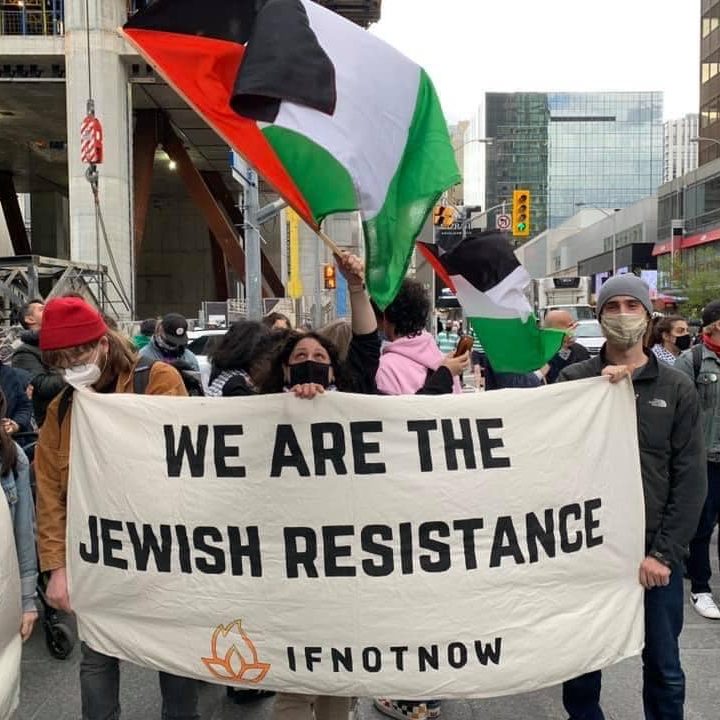In May, I participated in a solidarity delegation to Palestine with the Centre for Jewish Nonviolence (CJNV). Close to 40 Jews from across the US, Canada, and the UK who participated in the delegation went to join in solidarity with the Palestinian people living under occupation.
We spent the first week in East Jerusalem/ Al-Quds, before going to travel to Masafer Yatta in the south Hebron Hills. The drive is less than 70 kilometres, but it is a trip that most of the Palestinians we were about to meet have never taken. Our drive involved passing through the Green Line (an internationally recognized border between Israel and Palestine) and its accompanying checkpoints.
My anxiety felt palpable as we approached our first checkpoint. The armed border guard took one look at all of the Jewish faces on the bus and waved us right through, just as our staff leaders had predicted. “They’re not worried about us,” staff told us.
Giant red signs greeted us on the other side, warning of extreme danger for non-Arabs up ahead and imploring us to turn around before we were injured or killed.
As we approached our first destination, the village of Susya, large concrete slabs sat on both sides of the road. These signs indicated we were entering a firing zone. These firing zones, composed of mostly Palestinian villages, are areas that the military has claimed it needs for training. There are two types of firing zones: wet and dry. These are distinguished by whether the army is using live ammunition, or merely rubber encased bullets and other ‘non-lethal’ weaponry.
Settler violence a normal part of life for Palestinians
We approached a run-down concrete slab before being ushered into the family home of CJNV’s movement partner, Nasser, who works as a field researcher for B’tselem, an Israeli human rights organization. Nasser’s family welcomed us with a feast of freshly made food, while Nasser explained that a playground used to stand on that concrete but settlers came and destroyed it. The playground was one of the few resources for children in the area. Nasser faced down brazen settler violence to try and protect the swing sets and slides and to document the violence. For his bravery, he was falsely charged with assaulting an officer. Because Palestinians are not allowed to build anything in their villages, the playground stays as rubble, a bitter reminder of childhood under occupation.
After lunch, we arrived at the village of Tuba, also located in Masafer Yatta. We were there to build a playground. Building a playground is a revolutionary act because building is prohibited. Construction can instantly draw the ire of both settlers and army, who are quick to destroy any new structures, and some additional ones for good measure.
The community is so excited for this playground to be built (and concerned how long it will remain) that they’ve built and installed the swing sets without us. Already these swings have transformed into a new community hub, filled with children from dawn to dusk and young men during the evenings.
When we arrived, we were instantly greeted by tea, coffee, and cushions for sitting. As we sipped our tea and pushed the children on the swings, our Palestinian comrades oriented us on the area. They advised that the army might come at any time, day or night, and declare this area a closed military zone. This means they can force us to leave and detain us for up to three hours if we remain. These three hours might be spent blindfolded, driven around in the back of a military Jeep then dumped out in the middle of the desert. But this fate is largely reserved for Palestinians.
We are warned that the bigger threat is Israeli settlers. Settlers surround the village on all sides and will often come over to survey the area. Unmasked settlers are often simply looking for an excuse to call the army, but it is masked settlers we must be vigilant about. These settlers, we are warned, are coming to beat us and do not discriminate between Palestinian and international volunteers. We were told to stop whatever we are doing and run when we see them approaching. Our Palestinian hosts assured us that we can run into any home in the village to seek safety from these settlers. Everyone is here to protect each other.
During three days of 30+ degree weather and sand-whipping winds, we worked side by side with the Palestinians to construct a beautiful children’s oasis in the middle of the desert.
Normally, construction can only happen in the dead of night in order to avoid instant demolition orders. But surrounded by the eyes of international volunteers, the army felt less emboldened to harass the local community. At night, we ate, drank tea, and rested – luxuries rarely afforded during the simplest of restoration projects.
Jewish safety does not require the oppression of Palestinians
Were these children such a threat that having a slide would cause the end of the Jewish people? As we giggled together and played in the sand, I could not believe this to be so. These children were not our enemies. They simply wanted the same things that most children are afforded with a second thought – safety, education and joy.
In our final meal together before departing from Masafer Yatta, our Palestinian movement partners thanked us for supporting their children. They thanked us for believing that their children deserved a childhood. They reminded us that every child has a right to swing on a swing set.
These movement partners, whom I had never met before, welcomed me into their homes with open arms. They fed me and sheltered me and humoured me as I attempted to muster up any sort of construction skills. After all this, they graciously thanked me for coming and asked when I was to return. I am deeply humbled by the hospitality and kindness of the Palestinians I met in the region.
Growing up, I learned that if I was ever in trouble, I should find a house with a mezuzah on it. I learned that Jewish safety comes from insulating oneself with others Jews and away from those who might cause us harm. And yet, in Israel it is the masked Israeli settler who seeks to harm me. The army that might cause my demise.
As a fresh pot of tea was boiled just for me, I contemplated how it could be that our desire for safety as Jewish people has forced the children I’ve met to live in a live firing zone, where destruction could be around every corner. I believe in a world where my safety does not come at the expense of Nasser’s.
This past week, settlers destroyed so much infrastructure in Susiya that ten Israeli activists needed to spend the night to ward off the violence. As the war on Gaza continues, settlers in the West Bank are growing more emboldened, as they are armed by the Israeli government. The time is now for all Jews of conscience to stand up and stay: not in our name.
Did you like this article? Help us produce more like it by donating $1, $2, or $5. Donate


